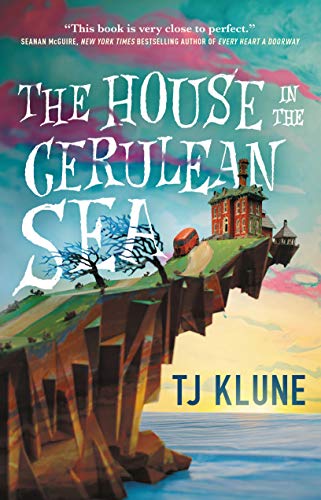T. J. Klune
Tor Books/Tom Doherty Associates

“Why are (the townspeople) like this?”
“I don’t pretend to know the minds of men,” she said, hands tightening on the steering wheel as a woman on the sidewalk appeared to shield her chubby, squawking children away from the car. “They fear what they don’t understand. And that fear turns to hate for reasons I’m sure even they can’t begin to comprehend. And since they don’t understand the children, since they fear them, they hate them. This can’t be the first time you’ve heard of this.”
from The House in the Cerulean Sea
Regaining enchantment
Fantasy can get us back in touch with the make-believe world we knew as children. Not current with the state of young adult (YA) literature, I sought out an authority, a 13-year-old avid reader. She enthusiastically recommended this book, a funny, charming fantasy with a punch.
Linus Baker is a middle-aged caseworker with the Department in Charge of Magical Youth. Extreme Upper Management sends him to investigate an orphanage of special children on the coast.
Linus would be one of Eliot’s Hollow Men, a Walter Mitty without the daydreams. Prizing order and routine, he carries with him the 900+-page RULES AND REGULATIONS wherever he goes. His world is a rather joyless, gray sameness.
The orphanage contains only six children: Talia is a gnome, and thereby a master gardener; Phee is a forest sprite; Sal, a black teenager who’s been badly abused in the foster system, shapeshifts into a fluffy Pomeranian whenever scared, which is much of the time; Theodore is a wyvern, a mythical 2-legged winged creature (I had to look it up, too); and Chauncey is a…well, no one’s really sure what Chauncey is, a kind of big-hearted jelly-fish-like creature who dreams of becoming a bellhop when he grows up.
The sixth child is Lucifer, son of Satan, called Lucy, who is 6 years, 6 months, and 6 days old. He, too, has been abandoned—but why would we ever expect Satan to be a model parent?
Think Miss Peregrine’s Home for Peculiar Children, only with the Antichrist. Linus is at first unnerved by these extraordinary children. “I am evil incarnate,” Lucy roars. (Imagine a 6-year-old having an especially bad day.) “I am the blight upon the skin of this world. And I will bring it to its knees. Prepare for the End of Days! Your time has come, and the rivers will run with the blood of the innocents!” Talia sighs. “He’s such a drama queen.”
Overseeing and protecting the orphans is the kindly Arthur Parnassus, who believes each child is special and has special gifts if nurtured and given the freedom to develop them. Even Lucy. Especially Lucy. Arthur recognizes them as unique beings, each to be valued for the special experiences and talents he or she possesses. Not surprisingly, to the townsfolk, they are monsters.
Like Linus, the reader may initially find the children unsettling, but soon comes to see them as, yes, okay, maybe strange, but also strangely wonderful beings.
The book could be read simply as a plea to respect and value differences, but that is only half the story. This whimsical, sweet and humorous tale suggests that we not just tolerate differences but celebrate them, for they can enrich, enhance, and add color to our own lives, changing one’s monochrome world into something absolutely cerulean.
This review first appeared in The Columbia River Reader (May 15, 2023.) Reprinted with permission.



